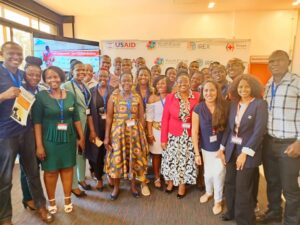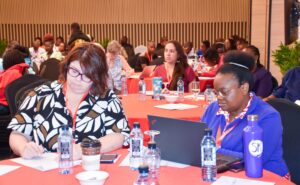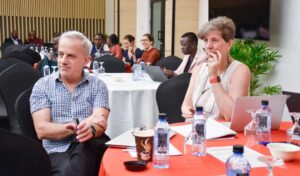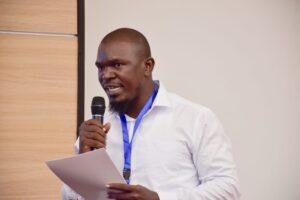
The Kisumu Icon Data Summit II 2024, organized by Youth Excel with support from the project partners USAID and the Kenya Red Cross, marked a significant milestone in addressing youth work readiness in Kisumu County. This two-day event showcased pivotal findings from research conducted by ten youth-serving organizations in Kisumu County, focusing on three key areas: Capacity Building, Youth Inclusion in Policy-Making for Business, and access to information on business support. The summit emphasized the need for grassroots transformation through partnerships and strategic collaborations, an approach strongly advocated by the Grassroots Transforming Network (GTN).
Understanding the Icon Data Summit II
The Data Icon Summit is a collaborative platform that seeks to address youth development issues through shared learning, data analysis, and research project implementation. The summit’s core components include:
- Shared Youth Development Issue Areas and Learning Questions: Identifying and addressing common challenges faced by youth.
- Collaborative Data Analysis and Learning: Engaging multiple stakeholders in analyzing data and deriving actionable insights.
- Iterative Micro-Grants for Research Projects: Providing funding to implement research-driven solutions.
- Intergenerational Collaboration: Engaging adult allies to support youth initiatives.
- Knowledge Mobilization and Advocacy: Sharing research findings and advocating for change through events like the Data Summit.
Thematic Focus of the Icon Data Summit II
The summit concentrated on three primary thematic areas:
- Capacity Building and Skills Development
- Youth Inclusion in Policy-Making for Business
- Access to information on business support and Employment Opportunities
Youth Work Readiness in Kisumu – Key Findings and Resolutions
Capacity Building and Skills Development
Research conducted across Muhoroni, Kisumu Central, East, Western, and Nyakach highlighted significant challenges in business financing for youth:

- Request for Business Support: 90% of the youth are requesting that business support be provided at the community level.
- Business Registration: 68% of youths have not registered their businesses.
- Lack of Access to Business Grants: Over 60% of youths do not have access to business grants.
- Financial Resource Access: Only 7% of youths have attempted to access financial resources.
The Data Summit team proposed several resolutions to address these issues:
- Digitalize Business Financing: Streamline the process to make it more accessible.
- Harmonize Financial Rates: Align rates with leading institutions to facilitate easier access.
- Develop Partnerships: Collaborate with funders such as the Uwezo and Youth Enterprise Funds (YEP).
- Introduce Tax Discounts: Provide tax incentives for youth-led businesses.
Grassroots Transforming Network’s approach to capacity building emphasizes the need of business financing impact and information to be provided at the community level. GTN approach to youth work readiness in Kisumu county also envisions the need for skills development and capacity building tailored to meet the needs of youth and women at the grassroots level.
Enhancing Evidence-Based Decision Making through Policy Implementation
The research aimed to assess youth involvement in public participation within Kisumu County. Key findings included:

- Low Participation in Public Forums: 40% of youths do not attend public participation events.
- Lack of Awareness: 70% of youths do not understand the content of the County Integrated Development Plan (CIDP).
To address these issues, the team proposed implementing a Trainer of Trainers (TOT) model to educate youth on public participation. GTN plans to adopt a clan-based policy advocacy model using grassroots champions. These champions will be trained to educate others within their clans, ensuring that youth development policies are driven by grassroots-level inputs.
Access to Business Support and Employment Opportunities
The summit underscored the critical need for youth to access business support and employment opportunities, which are essential for sustainable youth readiness in Kisumu County. The research and data collected indicated the lack of resource centers in rural communities. Grassroots transforming network is keen to have collaborate discussions with different stakeholders to see the implementation of modern resource centers in rural communities.
GTN’s Perspective On Youth Work Readiness

Grassroot Transforming Network‘s Executive Director Steve Misiga Oredo, who attended the summit on behalf of the GTN family, emphasized the importance of grassroots transformation through partnerships and strategic collaborations.
He highlighted the need for inclusive policy-making, saying, “Involving youth in policy-making processes is vital for sustainable development. We must ensure that their voices are heard and their needs are addressed at every level.” He also advocated for the creation of clan-based policy champions to ensure youths effectively engage in policy-making processes from the grassroots level.
Mr. Oredo also stressed the importance of strategic collaborations, stating, “This summit provides a platform for creating strong partnerships that can drive real change. By working together, we can develop innovative solutions to the challenges faced by our youth.”
He concluded by calling for a collective effort to transform the youth work landscape in Kisumu, “Our call to action is clear – we need to mobilize resources, advocate for supportive policies, and create opportunities for our youth. Together, we can achieve grassroots transformation and build a brighter future for Kisumu.”
Wrap – Up
The Kisumu Icon Data Summit II 2024 has laid the groundwork for transformative changes in youth work readiness in Kisumu county. By giving the data that addresses crucial issues in capacity building, policy involvement, and access to information on businesses, the summit has set a robust foundation for future initiatives.
Through structured collaborations, the Grassroots Transforming Network (GTN) is committed to supporting youth work readiness through targeted training, advocacy, and grassroots mobilization to ensure the sustainable development of Kisumu’s youth.
